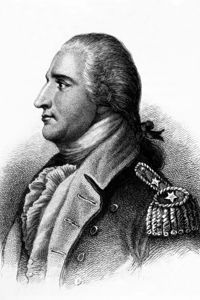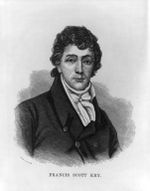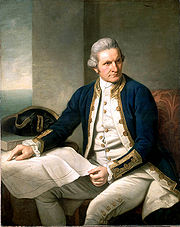1779
| Millennium: | 2nd millennium |
|---|---|
| Centuries: | 17th century – 18th century – 19th century |
| Decades: | 1740s 1750s 1760s – 1770s – 1780s 1790s 1800s |
| Years: | 1776 1777 1778 – 1779 – 1780 1781 1782 |
| 1779 in topic: |
| Subjects: Archaeology – Architecture – |
| Art – Literature (Poetry) – Music – Science |
| Countries: |
| Leaders: State leaders – Colonial governors |
| Category: Establishments – Disestablishments |
| Births – Deaths – Works |
Year 1779 (MDCCLXXIX) was a common year starting on Friday (link will display the full calendar) of the Gregorian calendar (or a common year starting on Tuesday of the 11-day slower Julian calendar).
Contents |
Events of 1779
January–June
- January 9 – British troops surrender to the Marathas in Wadgaon, India, and are forced to return all terrorities acquired since 1773.
- January 11 – Ching-Thang Khomba is crowned King of Manipur.
- January 22 – American Revolutionary War: Claudius Smith is hanged at Goshen, Orange County, New York for supposed acts of terrorism upon the people of the surrounding communities.
- January 29 – After a second petition for partition from its residents, the North Carolina General Assembly abolishes Bute County, North Carolina (established 1764) by dividing it and naming the northern portion Warren County (for Revolutionary War hero Joseph Warren) and the southern portion Franklin County (for Benjamin Franklin). The General Assembly also establishes Warrenton (also named for Joseph Warren) to be the county seat of Warren County and Louisburg (named for Louis XVI of France) to be the county seat of Franklin County.

Benedict Arnold
- February 14: Captain James Cook dies on the Sandwich Islands on his third and last voyage.
- March 10 – Treaty of Aynalıkavak between Ottoman Turkey and Russian Empire about Crimean Khanate.
- May 13 – War of Bavarian Succession: Russian and French mediators at the Congress of Teschen negotiate an end to the war. In the agreement Austria receives a part of the Bavarian territory (the Innviertel) and relinquishes the rest.
- June 1 – American Revolutionary War: Benedict Arnold is court-martialed for malfeasance in his treatment of government property.
- June 16 – American Revolutionary War: In support of the U.S., Spain declares war on England.
July–December
- July 16 – American Revolutionary War: United States forces led by General Anthony Wayne capture Stony Point, New York from British troops.
- July 22 – Battle of Minisink: The Goshen Militia is destroyed by Joseph Brant's forces.
- July 24 – American Revolutionary War: American forces led by Commodore Dudley Saltonstall launch the Penobscot Expedition in what is now Castine, Maine, resulting in the worst naval defeat in U.S. history until Pearl Harbor.
- July – The Great Siege of Gibraltar (fourteenth and last military siege) starts. This is an action by French and Spanish forces to wrest control of Gibraltar from the established British garrison. The garrison, led by George Augustus Eliott, later 1st Baron Heathfield of Gibraltar, survives all attacks and a blockade of supplies.

The Defeat of the Floating Batteries at Gibraltar, September 1782, by John Singleton Copley
- September – Battle of Baton Rouge: Spanish troops under Bernardo de Galvez capture the city from the British.
- September 23 – American Revolution – Battle of Flamborough Head: The American ship Bonhomme Richard, commanded by John Paul Jones, engages the British ship Serapis. The Bonhomme Richard sinks, but the Americans board the Serapis and other vessels, and are victorious.
- October 4 – The Fort Wilson Riot takes place.
- November 2 – The North Carolina General Assembly carves a new county from Dobbs County, North Carolina and names it Wayne County in honor of United States General Anthony Wayne.
- December 13 – Alexandre, Vicomte de Beauharnais marries Joséphine Tascher.
- December 25 – Fort Nashborough, later to become Nashville, Tennessee, is founded by James Robertson.
Undated
- The Iron Bridge is completed across the River Severn in Shropshire (the first all cast-iron bridge ever constructed).
- Boulton and Watt's Smethwick Engine, now the oldest working engine in the world, is brought into service.
- The city of Tampere, Finland is founded.
Births
| Gregorian calendar | 1779 MDCCLXXIX |
| Ab urbe condita | 2532 |
| Armenian calendar | 1228 ԹՎ ՌՄԻԸ |
| Bahá'í calendar | -65 – -64 |
| Bengali calendar | 1186 |
| Berber calendar | 2729 |
| Buddhist calendar | 2323 |
| Burmese calendar | 1141 |
| Byzantine calendar | 7287 – 7288 |
| Chinese calendar | 戊戌年十一月十四日 (4415/4475-11-14) — to —
己亥年十一月廿四日(4416/4476-11-24) |
| Coptic calendar | 1495 – 1496 |
| Ethiopian calendar | 1771 – 1772 |
| Hebrew calendar | 5539 – 5540 |
| Hindu calendars | |
| - Bikram Samwat | 1835 – 1836 |
| - Shaka Samvat | 1701 – 1702 |
| - Kali Yuga | 4880 – 4881 |
| Holocene calendar | 11779 |
| Iranian calendar | 1157 – 1158 |
| Islamic calendar | 1192 – 1193 |
| Japanese calendar | An'ei 8 (安永8年) |
| Korean calendar | 4112 |
| Thai solar calendar | 2322 |
- January 5 – Stephen Decatur, American naval officer (d. 1820)
- January 18 – Peter Mark Roget, British lexicographer (d. 1869)
- March 6 – Antoine-Henri Jomini, French General (d. 1869)
- March 15 – William Lamb, 2nd Viscount Melbourne, Prime Minister of the United Kingdom (d. 1848)
- May 28 – Thomas Moore, Irish poet (d. 1852)
- August 1 – Francis Scott Key, American lawyer and lyricist (d. 1843)
- August 20 – Jöns Jakob Berzelius, Swedish chemist (d. 1848)
- August 29 – Jean Auguste Dominique Ingres, French painter (d. 1867)
- November 14 – Adam Gottlob Oehlenschläger, Danish poet (d. 1850)
- date unknown – Giacomo Beltrami, Italian explorer (d. 1855)

August 1: Francis Scott Key
Deaths

Portrait of Captain James Cook, by Nathaniel Dance
- January 3 – Claude Bourgelat, French veterinary surgeon (b. 1712)
- January 20 – David Garrick, English actor (b. 1717)
- January 22 – Jeremiah Dixon, English surveyor and astronomer (b. 1733)
- February 7 – William Boyce, English composer (b. 1711)
- February 14 – James Cook, British naval captain and explorer (b. 1728)
- February 24 – Paul Daniel Longolius, German encylopedist (b. 1704)
- April 24 – Eleazar Wheelock, American founder of Dartmouth College (b. 1711)
- May 3 – John Winthrop, American astronomer (b. 1714)
- June 7 – William Warburton, English critic and Bishop of Gloucester (b. 1698)
- 23 June – Ras Mikael Sehul, Enderase of Ethiopia
- September 12 – Richard Grenville-Temple, 2nd Earl Temple, English politician (b. 1711)
- October 11 – Kazimierz Pułaski, Veteran commander of Polish, Russian, and American troops (b. 1745)
- November 16 – Pehr Kalm, Finnish explorer and naturalist (b. 1716)
- December 6 – Jean-Baptiste-Siméon Chardin, French painter (b. 1699)
- December 8 – Nathan Alcock, English physician (b. 1707)
- December 16 – Emperor Go-Momozono of Japan (b. 1758)
- December 17 – Giuseppe Carcani, Italian composer (b. ?1703)
- December 23 – Augustus Hervey, 3rd Earl of Bristol, British admiral and politician (b. 1724)